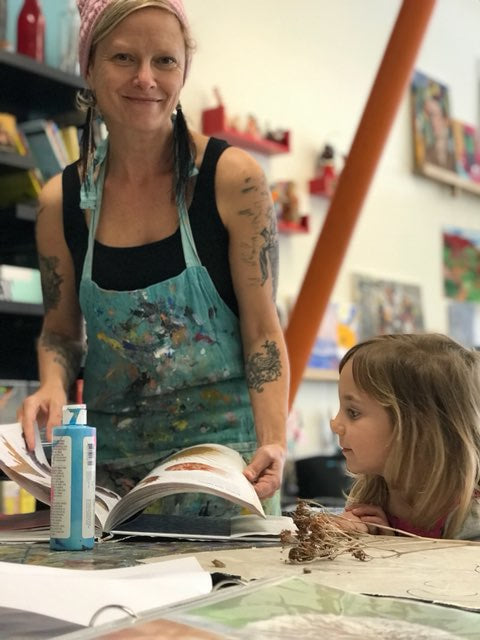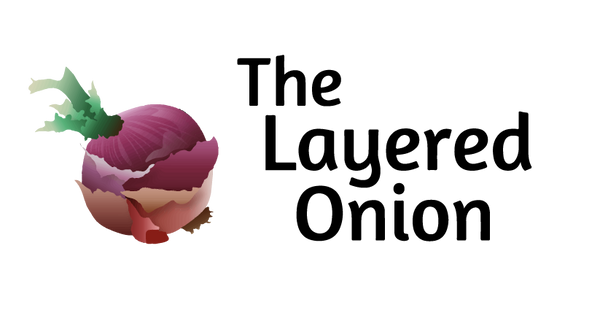
Artwork Spotlight: Kat Gibbons’ The Dying Seed
Share
In the Artwork Spotlight series of blog posts, the Layered Onion highlights a specific work by an artist in the community. These works could range from short stories to visual art to music and more!
Today, Kat Gibbons (she/her/hers) will be sharing her piece The Dying Seed. Here’s a sneak peak of what Kat has to say about this piece: “I’ve gotten a lot of positive feedback about this piece which is what I want from this series. If people can associate beauty with taboo female experiences, I have achieved something in my mind.”
But before we jump into the Q+A about this particular piece, let’s learn a little more about Kat!

Kat Gibbons, The Dying Seed, Multimedia tapestry hung from reclaimed driftwood
Kat Gibbons is a self-taught artist and Educational Therapist working with exceptional and at-risk youth through the arts. Her current obsession is tapestry weaving, which she developed during the pandemic. This was a response to the need for sensory experiences that were calming. She is currently working on a series of tapestries about menopause and a series of portraits about children’s mental health. Her past work includes portrait painting, illustration, sculpture, photography and other textile pieces. Katherine joined The Layered Onion because art has saved her life from a Major Depressive Disorder, Anxiety and Trauma. In an effort to continue supporting the children with whom she creates, Katherine wants to expand her connections and understanding of working artists who have also struggled with mental well-being and be a supportive participant in the lives of other artists. She has a strong desire to bring light to the undeniable need for the arts in the lives of all children but especially children who have exceptional needs and gifts.
Knowing a little more about Kat, let’s jump into the Q+A about The Dying Seed.
What are the mediums you used for this piece?
On this piece I used yarn, cotton string, dyed roving, a feather and the white hair in the middle is still a mystery. I almost always hang the pieces from driftwood and this piece I got on the shores of Lake Michigan.
What was your inspiration to begin work on this piece?
My inspiration for this piece was initiated by the use of bright colors but I always have to balance them with muted tones. I am always inspired by wool and am trying to work mostly with wool and wool blends. I can speak more to the theme in the next question.
In your description of the piece, you mention that it is part of a series. Would you be willing to speak a little more about the series this work belongs to?
I had been thinking for some time about doing a series of tapestries about menopause because those of us experiencing it are often living in a space of mystery and anger about how little people still know or how to discuss it, as it is still very taboo. So, I began a series and am currently working on the third piece, which is quite large.
I think I see roving towards the center of the piece, which really adds a lot of texture and movement, especially when placed against the spun yarn. How did you choose your yarn colors and thicknesses?
There is this wonderful recycled art supplies store in Boulder, Colorado called Art Parts and often I like to just wander and see what is available. Often they will have raw sheep’s wool or odd bits of fur or hair for sale and I always go for that. However, I began felting years ago and yarn stores are addictive with all the colors and textures. I try to choose yarn from farms and small places in the UK, Ireland or New Zealand. I am a forager by nature so I always incorporate bits of wood, bone or feathers into my pieces. I tend to love muted, natural colors in contrast with bright colors, which have specific meaning for me. My last series was Landsape Tapestries, so lots of blues and browns and greens. I don’t really know where each piece will take me but I do like to have a lot of texture and encourage people to feel the tapestries with their hands.
Were there any specific challenges you ran into while creating the piece? How did you work through them?
I am always challenged by how tight I can make the piece with all the different things going on and hanging is always a challenge because driftwood is curvy and bent but eventually it becomes its own special piece. I just work with it and let it hang for some time, watching it to see how it is becoming.
Is there a website or any social media pages you’d like me to share if folks are interested in seeing more of your work?
I am on Instagram @kgibbonscreativeaid and you can see more of my other mediums on the My Work page on my website. This is the textiles page but I am also a painter, illustrator and photographer. http://www.kgibbonscreativeaid.com/textiles-and-natural-materials.html
Thank you so much for sharing your work, Kat!
